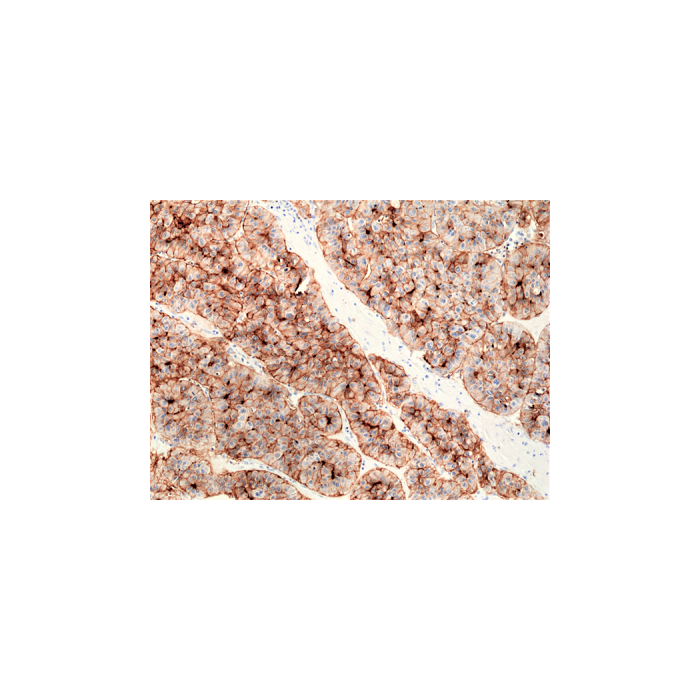Cookie Policy: This site uses cookies to improve your experience. You can find out more about our use of cookies in our Privacy Policy. By continuing to browse this site you agree to our use of cookies.
RevMab
anti-CD73 (human), Rabbit Monoclonal (RM431)

| Product Details | |
|---|---|
| Synonyms | 5'-Nucleotidase; Ecto-5'-nucleotidase; 5'-NT; EC:3.1.3.5 |
| Product Type | Recombinant Antibody |
| Properties | |
| Clone | RM431 |
| Isotype | Rabbit IgG |
| Source/Host | Rabbit |
| Immunogen/Antigen | A recombinant human CD73 protein. |
| Application |
Immunohistochemistry (IHC): 1:100-1:400 dilution Western Blot (WB): 1:1000 - 1:2000 dilution |
| Crossreactivity | Human |
| Specificity |
RM431 reacts to human CD73. |
| Purity | Protein A purified. |
| Purity Detail | Protein A affinity purified from an animal origin-free culture supernatant. |
| Concentration | N/A |
| Formulation | Liquid. 50% Glycerol/PBS with 1% BSA and 0.09% sodium azide. |
| Isotype Negative Control | |
| Other Product Data |
Click here for Original Manufacturer Product Datasheet |
| Accession Number | P21589 |
| Declaration | Manufactured by RevMab Biosciences. |
| Shipping and Handling | |
| Shipping | BLUE ICE |
| Long Term Storage | -20°C |
| Handling Advice | Avoid freeze/thaw cycles. |
| Use/Stability | Stable for at least 1 year after receipt when stored at -20°C. |
| Documents | |
| Product Specification Sheet | |
| Datasheet |
 Download PDF Download PDF |
CD73 (Ecto-5-prime-nucleotidase; 5-prime-ribonucleotide phosphohydrolase) catalyzes the conversion at neutral pH of purine 5-prime mononucleotides to nucleosides, the preferred substrate being AMP. CD73 is used as a marker of lymphocyte differentiation. Consequently, a deficiency of CD73 occurs in a variety of immunodeficiency diseases. CD73 is also a marker of undifferentiated mesenchymal stem cells and is often used to identified stem cell populations. Defects in the CD73 gene can lead to the calcification of joints and arteries and intestinal tuberculosis. Extracellular adenosine is a potent endogenous immunosuppressive mediator critical to the maintenance of homeostasis in various normal tissues including the lung. Adenosine is either released from stressed or injured cells or generated from extracellular adenine nucleotides by the concerted action of the ectoenzymes ectoapyrase (CD39) and 5′ ectonucleotidase (CD73) that catabolize ATP to adenosine. An acute CD73-dependent increase of adenosine in normal tissues mostly exerts tissue protective functions. CD73 is upregulated on a number of cancer cell types and catalyzes the conversion of extracellular nucleotides, such as AMP, to membrane-permeable nucleosides, such as adenosine; it plays a key role in adenosine-mediated immunosuppression within the tumor microenvironment. High CD73 expression in the tumor tissue has been linked to poor overall survival and recurrence free survival in patients suffering from breast and ovarian cancer. CD73 and adenosine support growth-promoting neovascularization, metastasis and survival in cancer cells. In addition, adenosine can promote tumor intrinsic or therapy-induced immune escape by various mechanisms that dampen the immune system. Consequently, modulating CD73 or cancer-derived adenosine in the tumor microenvironment emerges as an attractive novel therapeutic strategy to limit tumor progression, improve antitumor immune responses, avoid therapy-induced immune deviation, and potentially limit normal tissue toxicity.





